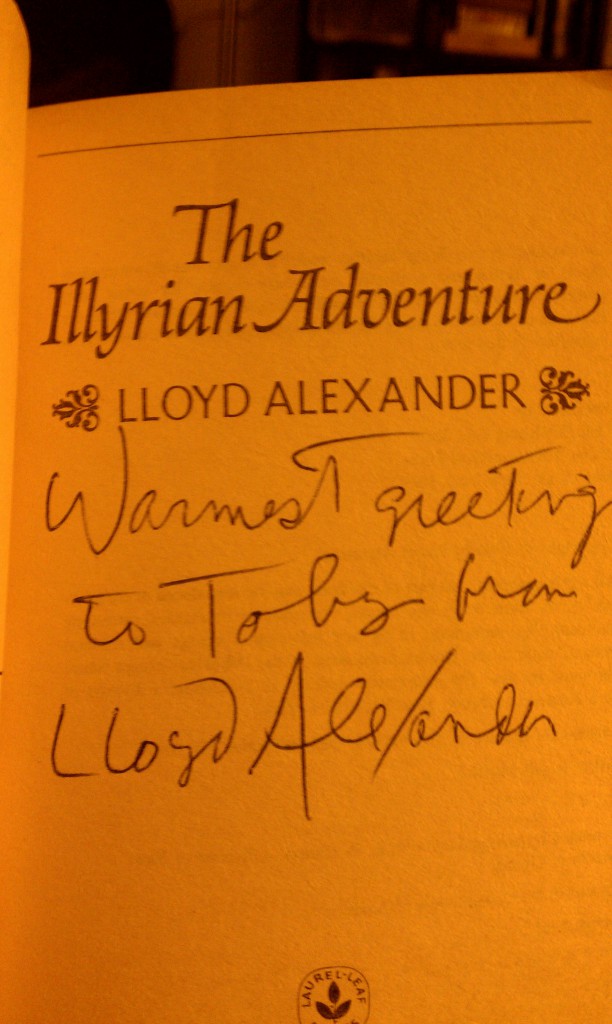We spend a lot of time at our local public library, which happens to be the D.C. Public Library’s Southeast branch, near Eastern Market. We check out books, of course–armfuls of them, because my offspring don’t believe in the one-book-at-a-time approach to reading.
We also like to drop by the used-book sale the library has every month or so. It’s not like we need more books in the house–except that we always need more books in the house. There’s a certain SPCA impulse that kicks in, too: I can’t leave this one behind because if I don’t buy it nobody will! Also, hey, 50 cents or a buck’s not much to spend, and it’s for a good cause.
The library always has a couple of tables of kids’ books set up at the sale. That’s where I spotted a copy of The Illyrian Adventure by Lloyd Alexander. I didn’t know the novel but I have been a Lloyd Alexander fan since I was my daughter’s age. I loved The Book of Three and the rest of the Prydain Chronicles, and it has been one of parenting’s great joys to re-read them with my kids, along with a lot of my other childhood favorites, like A Wizard of Earthsea.
The Illyrian Adventure came home with us from the library sale. It wound up in one of the random and ever-shifting stacks of books that punctuate the living room. I dug it out one idle night, opened it up, and found this on the title page:

Lloyd Alexander! He’d signed the book I was holding. He’d held it in his hands, however many years ago, and signed it with a flourish of ballpoint ink. I was thrilled. Alexander died in 2007, and I never had a chance to meet him. Discovering his signature in the book I’d rescued gave me a sense of personal proximity, a sense that I had bridged some distance between us.
I don’t know who Toby is or why he let his signed copy of The Illyrian Adventure go. Maybe he died; maybe he grew up and left home and his books behind; maybe he just didn’t much like the story. I hope it wasn’t a bad parting. I am glad to give the book a new home, inscription and all.
When I showed the inscription to my husband, he said: “You can’t do that with an ebook.” What he meant was in e-format you can’t get that sense of direct physical connection, of personality on the page, that an author’s ink-on-paper signature creates. Likewise with digital marginalia: The words transfer eletcronically but the sense of handling does not, at least not yet. Handwriting conveys a sense of character that computer characters do not. At least not yet. Will they ever? (I write more about this in the Feb./March issue of Bookforum, in a review-essay on Philip Hensher’s The Missing Ink: The Lost Art of Handwriting and Ian Sansom’s Paper: An Elegy.)
Last summer I took a week-long course on “Born-Digital Materials” at Rare Book School at the University of Virginia in Charlottesville, Va. I learned there to appreciate the materiality of machines more. I began to see how hardware and software capture some of the essence of those who create on and with them. I don’t hate e-books, and I think they will develop in ways I can’t foresee. But I can’t quite imagine, not yet anyway, the digital library sale of the future with virtual tables of e-books to flip through and the chance to discover “warmest greetings” from the author.

